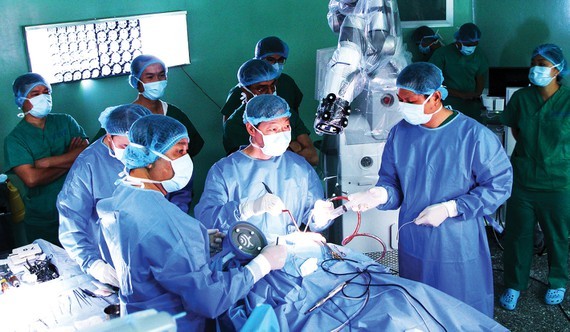
The health sector has stated at an international seminar on smart medicine organized by the municipal People’s Committee yesterday to introduce and share experiences in using IT applications in healthcare activities.
Deputy Head of the Department of Health Dr. Tang Chi Thuong said that the health sector of the city has implemented many smart applications such as the People Hospital's 115 smart emergency station , robotically- assisted surgeries of Binh Dan Hospital, SMS application in tele diabetes management during pregnancy of Hung Vuong Maternity Hospital, and artificially intelligent tools in cancer treatment of Tumor Hospital and Robot Modus V Synaptive system for nerve operation of the People Hospital's 115.
Especially, many initiatives have been applied in treatment and caring for patients in Mien Dong Hospital and they have satisfied patients a lot.
However, smart applications in medicine in Ho Chi Minh City have just been piloted, as Dr. Tang Chi Thuong said. The city needs to have more creative steps in the upcoming time to be in tune with real smart medicine.
Specifically, he mentioned what the city health sector must do including re-structuring medical IT infrastructure, building common database, establishing IT center for the health sector alone. In addition, it should learn experiences from neighboring countries in the Asian region and in the world.
Above all, hospital mangers must be determined in following smart medicine with the support of city authorities.
Dr. Tang Chi Thuong added that first of all, the health sector will build electronic healthcare system to manage a citizen’s medical record in grass root infirmaries. Emergency station 115 uses smart emergency system to coordinate its satellite facilities meantime the Disease Control Center employs technology to early detect and treat non-contagious diseases to prevent it from spreading.
Apart from that, the Department of Health is responsible for building large database for the health sector as well as applications for management in the healthcare field, said Dr. Thuong.
Standing Deputy Chairman of the city People’s Committee Le Thanh Liem said two years ago, the city authorities have announced the project to develop Ho Chi Minh City into a smart city for the period 2017-2019 with the vision to 2025.
The project in addition to building infrastructure for IT basis for smart city focuses on carrying out smart solutions – the city’s urgent demands during implementation of seven breakthrough programs to bring benefits for city dwellers. These solutions are comprising of digital government, smart traffic, fold prevention, security order, and healthcare.
Initially, technology applications in the medicine field have produced positive achievements greatly contributing to the smart city project, said Mr. Liem. It will be opportunities for the health sector to get access to artificial intelligent progresses in the globe with the aim to bring patient satisfaction.
Speaking at the seminar, Standing Deputy Secretary of the city Party Committee Tran Luu Quang thanked for contributors to the city smart health. Presently, the health sector is taking care of more than 13 million dwellers and 30 million people in the southern region; accordingly, patient overloading is unavoidable.
The applications of technology will help reduce overloading in big hospitals but patients can receive treatment in grass root medical centers without flocking to Ho Chi Minh City to save time and cost, he said.
























